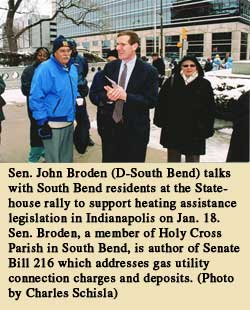Advocates rally at Statehouse for
lower heating costs for poor
By Brigid Curtis Ayer
 Hoosiers from northern Indiana traveled to Indianapolis for a Jan. 18 Statehouse rally to support heating assistance legislation for low-income families—an issue the Indiana Catholic Conference also supports based on the biblical teaching of protecting the poor who are the least among us (Matthew 25).
Hoosiers from northern Indiana traveled to Indianapolis for a Jan. 18 Statehouse rally to support heating assistance legislation for low-income families—an issue the Indiana Catholic Conference also supports based on the biblical teaching of protecting the poor who are the least among us (Matthew 25).
(See a list of the heating bills supported by the Indiana Catholic Conference)
Rep. Win Moses (D-Fort Wayne), author of House Bill 1094, who spoke at the rally, said, “As long as I’ve been in public service, this issue causes more family damage than any other issue. When a family’s home loses its heat, the home is condemned and the family has to leave. It causes homelessness. It is a very serious problem.
“While this bill is aimed at helping the working poor, high gas prices have caused hardships for many middle-income families, too,” Moses added.
Mary Beth Fisher, public information director for the Indiana Utility Regulatory Commission (IURC)—the administrative body that makes the rules for Indiana utilities—said the IURC’s latest action was for the worst of the worst customers—those who do not pay their bills. The rule allowed utilities to collect up to four months of the average heating bill as a deposit for reconnecting service outside of moratorium months (November to March).
“During the moratorium months, the utility can charge up to two months’ deposit for the financially qualified customers. What the new rule did was to make it easier on customers while giving utilities the right to recoup some of their losses,” Fisher said.
“The IURC has been studying this issue for two years,” she continued. “What happens is those who qualify for heating assistance use the moratorium and the heating assistance money, yet still have a balance due when the moratorium ends. They owe hundreds of dollars and are disconnected. Then they come back in November and have their heat reconnected.”
While the commission sets ceilings for what utilities can charge, most of the utilities around Indianapolis do not collect the maximum, Fisher said. “The commission certainly looks forward to working with the legislature on this important issue.” The IURC is responsible for protecting both the consumer and Indiana utilities.
Senate Bill 352, authored by Sen. Tim Lanane (D-Anderson), appropriates up to $20 million from tax amnesty revenues to expand the availability of Indiana’s heating assistance program to low-income Hoosiers coping with increased home heating costs.
“For many families, this is the period when they need help the most,” Lanane said. “With this legislation, we can take leftover tax amnesty dollars that currently are just sitting in the state’s bank account and use them to help families struggling to pay their heating bills.”
Sen. John Broden (D-South Bend), author of Senate Bill 216, said at the rally his bill would reduce the deposit fee from a four-month estimated bill to a one-month estimated bill.
“In terms of dollars, this would reduce a deposit fee of $700 to about $150. The problem has really been with gas utilities,” said Broden, a member of Holy Cross Parish in South Bend, Ind. “People are going without heat because they can’t afford the deposit fee. They’re using space heaters. This is no way to live.
“In the winter of 2003-04, social services and churches in St. Joseph County alone documented they had paid $3 million for gas bills and deposit fees,” Broden continued. “This measure is really a compromise measure. It just reduces the deposit fees utilities can collect.”
Rep. Shelia Klinker (D-Laf-ayette), co-author of House Bill 1081, said her bill is designed “to help folks that are disabled and vulnerable in our state, including the aged, the people who can’t get out because they are either mentally or physically disabled.
“There are single parents with babies that need to have heat to keep their families warm,” said Klinker, a member of St. Mary Cathedral Parish in Lafayette.
“I’m really happy the Catholic Conference is working on this issue and it’s getting attention. It’s a big problem and it needs to be addressed.”
In 2005, the Coalition to Keep Indiana Warm (CKIW) used an independent source to study the home heating issue which resulted in a 31-page report detailing the effects that affordability of home energy has on low-income Indiana residents.
Vickie Allen-Beeson, co-chair of the coalition, who also spoke at the rally, said, “Between the months of April and June last year, 10,000 low-income customers were disconnected in Indiana.
“Last year, 80 percent of low-income families in Indiana came out of the winter months behind on their heating bills. While the state increased the number of households which could qualify for heating assistance—over 500,000 households qualify—the state does not have the money to fund the program,” Allen-Beeson said. “The other reality is many who qualify don’t know about it and many older Hoosiers are too proud to receive assistance and would rather go without prescriptions or food than have their heat turned off.”
(To view the Coalition to Keep Indiana Warm’s heat study titled, “Indiana Billing and Collection Reporting: Natural Gas and Electric Utilities,” go to the Indiana Community Action Association’s Web page at www.icap.org. Click on Coalition to Keep Indiana Warm, then click on the report by Roger Colton.
Bridget Curtis Ayer is a correspondent for The Criterion.) †
